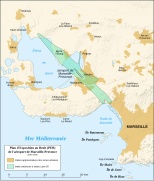The day–evening–night noise level or Lden is a 2002 European standard to express noise level over an entire day. It imposes a penalty on sound levels during evening and night[1] and it is primarily used for noise assessments of airports, busy main roads, main railway lines and in cities over 100,000 residents.[2][3][4] The penalty for sound production during evenings and nights is due to higher nuisance perception during quieter hours and to prevent sleep deprivation for nearby residents.
| Examples of several Lden levels around Marseille Provence Airport |
|
Definition
editLden is calculated as:[5]
Where the long-term average noise levels are defined as:
| Part of the day | hours | penalty (dB) |
|---|---|---|
| day | 07:00 - 19:00 | 0 |
| evening | 19:00 - 23:00 | 5 |
| night | 23:00 - 07:00 | 10 |
The exact hours of the three periods may be chosen differently by individual EU member states.
The formula for Lden can be considered a weighted average of the yearly individual noise level during day, evening and night.
See also
edit- Environmental noise directive
- Day-night average sound level, the US equivalent
References
edit- ^ Malcolm J. Crocker (5 October 2007). Handbook of Noise and Vibration Control. John Wiley & Sons. p. 15. ISBN 978-0-471-39599-7.
- ^ "Gesundheitsrisiken durch Umgebungslärm" [Health risks from environmental noise]. Umweltbundesamt. 2 June 2020.
- ^ Daniel R. Raichel (4 January 2006). The Science and Applications of Acoustics. Springer Science & Business Media. p. 331. ISBN 978-0-387-26062-4.
- ^ Norman J. Ashford; Saleh Mumayiz; Paul H. Wright (6 April 2011). Airport Engineering: Planning, Design, and Development of 21st Century Airports. John Wiley & Sons. p. 724. ISBN 978-1-118-00547-7.
- ^ Directive 2002/49/EC. 25 June 2002.



